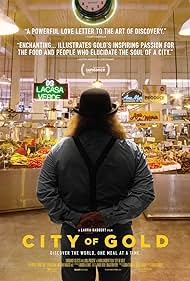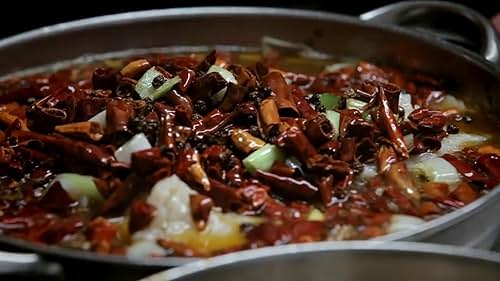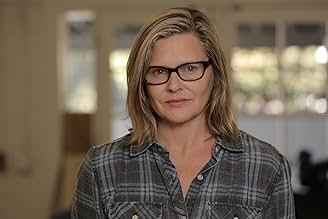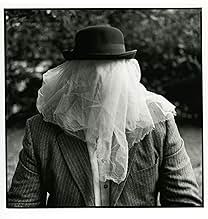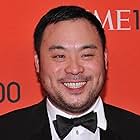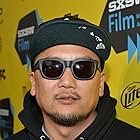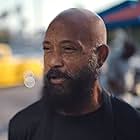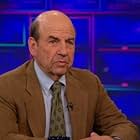IMDb RATING
7.2/10
1.1K
YOUR RATING
A documentary portrait that takes us into Jonathan Gold's universe to tell the improbable story of a revolution inspired by the pen, but driven by the palate.A documentary portrait that takes us into Jonathan Gold's universe to tell the improbable story of a revolution inspired by the pen, but driven by the palate.A documentary portrait that takes us into Jonathan Gold's universe to tell the improbable story of a revolution inspired by the pen, but driven by the palate.
- Awards
- 3 nominations
Storyline
Did you know
- TriviaJonathan Gold played 'Cello while studying at UCLA.
- Quotes
Jonathan Gold: I very rarely take notes in a restaurant. I'm more involved in, sort of, observing the music of the meal. I mean, you could take notes when you're having sex too but you'd, sort of, be missing out on something.
Featured review
If I am honest, I have never understood the appeal of the city of Los Angeles, but that is because perhaps I have never sought to understand it the way I have New York City. Jonathan Gold comments in the beginning of City of Gold that, "If you live in L.A. you're used to having people explain your city to you."
He explains that tourists often think they have unravelled the secret of a city that - instead of developing from a central business district outward - has developed from multiple scattered, unique centers which have over time bled toward one another leaving odd bits of space in between them where almost anything could develop. Gold points out that with this many cultural influences and communities, "The fault lines between them are sometimes where you find the most beautiful thing."
While the film is technically about Gold, who is the first food critic to receive a Pulitzer Prize for his writing, this is also a love story about the individual human threads that make up the city of Los Angeles and how the interaction of people through food helps define and preserve a sense of community.
Gold comments at one point that in L.A., "There really is a there-ness beneath the thereness," and the film is a visually appealing blend of sweeping aerial views and gritty, carefully chosen street level cameos paired with sounds that highlight the city's worlds within worlds and keeps what otherwise might have been merely a series of commentated meals from feeling monotonous.
Calvin Trillins, Evan Kleinman, Roy Choi, Ruth Reichl, and many others join in those meals and their carefully curated asides help explain how Gold writes, and why he doesn't operate similarly to any other food critic because as David Chang put it, "His empathy level is higher than anyone else's."
A favorite scene in the film follows Gold and his two children through an art museum. His son was slightly shaggy and inquisitive, and his daughter was wearing all sorts of layers and colors, her eyes were wide, and her smile was like sunlight on water. It was apparent that they were fully aware they were allowed to be themselves, and this summed up a lot about the way Gold perhaps sees, eats, and writes: You take things as they come because they are what they are for a reason, and they feed us in different ways.
I brought a friend with me to a screening of the film whose tastes in viewing do not usually tend toward documentaries, and he was irritated with me afterward. It turned out he had immensely enjoyed the film, but complained that it had made him terribly hungry. I didn't apologize. Watch City of Gold, and tip over the edge into Jonathan Gold's world of spices, scents, and beautifully chosen words until you understand what he means when he says that cooking is what makes us human. You might leave hungry, but hunger is life, and you can always go eat something unexpectedly real after the film is over.
He explains that tourists often think they have unravelled the secret of a city that - instead of developing from a central business district outward - has developed from multiple scattered, unique centers which have over time bled toward one another leaving odd bits of space in between them where almost anything could develop. Gold points out that with this many cultural influences and communities, "The fault lines between them are sometimes where you find the most beautiful thing."
While the film is technically about Gold, who is the first food critic to receive a Pulitzer Prize for his writing, this is also a love story about the individual human threads that make up the city of Los Angeles and how the interaction of people through food helps define and preserve a sense of community.
Gold comments at one point that in L.A., "There really is a there-ness beneath the thereness," and the film is a visually appealing blend of sweeping aerial views and gritty, carefully chosen street level cameos paired with sounds that highlight the city's worlds within worlds and keeps what otherwise might have been merely a series of commentated meals from feeling monotonous.
Calvin Trillins, Evan Kleinman, Roy Choi, Ruth Reichl, and many others join in those meals and their carefully curated asides help explain how Gold writes, and why he doesn't operate similarly to any other food critic because as David Chang put it, "His empathy level is higher than anyone else's."
A favorite scene in the film follows Gold and his two children through an art museum. His son was slightly shaggy and inquisitive, and his daughter was wearing all sorts of layers and colors, her eyes were wide, and her smile was like sunlight on water. It was apparent that they were fully aware they were allowed to be themselves, and this summed up a lot about the way Gold perhaps sees, eats, and writes: You take things as they come because they are what they are for a reason, and they feed us in different ways.
I brought a friend with me to a screening of the film whose tastes in viewing do not usually tend toward documentaries, and he was irritated with me afterward. It turned out he had immensely enjoyed the film, but complained that it had made him terribly hungry. I didn't apologize. Watch City of Gold, and tip over the edge into Jonathan Gold's world of spices, scents, and beautifully chosen words until you understand what he means when he says that cooking is what makes us human. You might leave hungry, but hunger is life, and you can always go eat something unexpectedly real after the film is over.
- stevenpmagstadt
- Mar 20, 2019
- Permalink
- How long is City of Gold?Powered by Alexa
Details
- Release date
- Country of origin
- Official site
- Language
- Also known as
- Город Голда
- Filming locations
- See more company credits at IMDbPro
Box office
- Gross US & Canada
- $640,979
- Opening weekend US & Canada
- $62,959
- Mar 13, 2016
- Gross worldwide
- $680,618
- Runtime1 hour 36 minutes
- Color
Contribute to this page
Suggest an edit or add missing content

